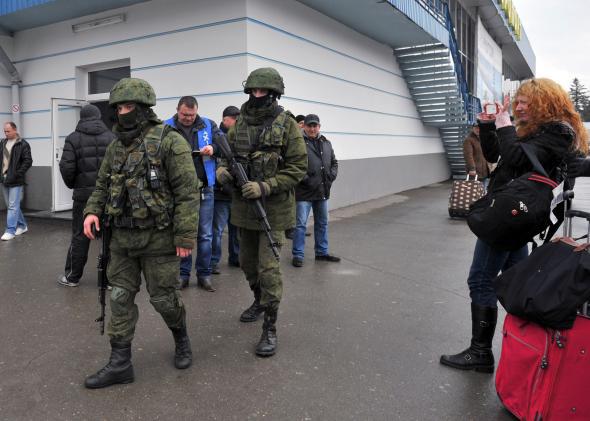Unidentified gunmen—almost certainly working on Russia’s behalf if not if actually Russian military personnel themselves—have seized two airports in Crimea, while separatist militia groups calling themselves the Russian Bloc have set up checkpoints on major highways in the region.
The new interior minister in Kiev has accused Russia’s Sevastopol-based Black Sea Fleet of taking part in the unrest, calling it an “armed invasion,” which a fleet spokesman has denied. Meanwhile, crowds of pro-Russian protesters have gathered outside the Crimean parliament chanting “take us back.”
Russia may not be annexing Crimea, and thus far has expressed no desire to do so, but at the very least the region is clearly falling out of Kiev’s control. So is there anything anyone can do about it?
Options seem limited. The fragile new Ukrainian government, which has other problems, not the least of which is keeping other parts of the country from splitting off, doesn’t really seem like it’s in a position to retake Crimea by force, risking a full armed intervention by the Black Sea Fleet. These moves likely violate the 1994 agreement between the U.S. and Russia under which Moscow agreed to respect Ukraine’s sovereignty within its current borders in return for Kiev giving up its Soviet-era nuclear weapons. Beyond verbal warnings, the United States certainly seems extremely unlikely to intervene.
So far, no one beyond the hard-core pro-Russian street protesters is talking about full absorption of Crimea into Russia. The Crimean parliament is just talking about greater autonomy for the region. From exile in Russia, ousted Ukrainian President Viktor Yanukovych says Crimea “should stay within the boundaries of Ukraine,” though he appears a bit detached from reality at this point. And while there is significant separatist sentiment in Crimea, I don’t think we can say for sure that it’s the majority.
If I had to guess, the most likely scenario at this point seems to be Crimea settling into a state of frozen conflict along the lines of Transnistria in Moldova or Georgia’s breakaway regions—a de facto autonomous territory under the heavy influence of Moscow but still technically considered by Kiev and its Western allies to be part of Ukraine.
If this is the outcome that is realized, I have a feeling a lot of people will read it as evil genius Putin once again getting one over on the West. But gaining de facto control over yet another dysfunctional pseudostate, essentially ensuring long-term tension with Kiev in the process, certainly doesn’t seem as good an outcome as what Russia thought it was getting a month ago: a government of the whole of Ukraine tied economically and politically to Russia rather than Europe. This isn’t really a great outcome for anyone.
